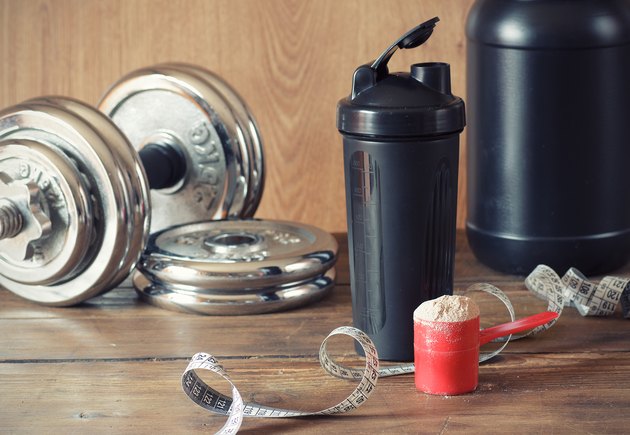Whey protein is a concentrated protein source made from the whey that's separated from curds during cheese making. It's high in leucine, an amino acid that preserves muscle and promotes fat loss, according to the University of Illinois McKinley Health Center. Whey protein is one of the most bioavailable forms of protein, meaning your body uses it efficiently.

Sponsored Links
Weight Loss
Preliminary studies suggest that taking whey protein on an empty stomach before meals may help if you want to lose weight. In a study published in 2008 in "Nutrition & Metabolism," obese subjects who took a whey protein supplement 20 minutes before breakfast and 20 minutes before dinner while cutting 500 calories a day lost more body fat and kept more muscle, compared with a control group on the same calorie restriction without the whey supplement. The whey protein subjects lost 6.1 percent of their body fat during the 12-week study. A 5 percent or greater fat loss lowers the risk of obesity-related diseases, the researchers noted.
Sponsored Links
Metabolism Boost
Taking whey on an empty stomach offers an alternative to skipping breakfast or having carbs before your workout when you're dieting. In a study on resistance-trained men and women, taking a whey protein supplement 20 minutes before training resulted in higher rates of resting energy expenditure for 24 hours after heavy resistance training when compared with taking a carbohydrate supplement, according to research published in the May 2010 "Medicine & Science in Sports & Exercise." Resting energy expenditure refers to your body's calorie-burning rate when you're not active. The researchers concluded that this increase could result in greater fat burning if calorie intake stayed the same. Although further research is needed, this increased after-burn effect may benefit bodybuilders, wrestlers, fitness athletes and others who need to train hard and reduce body fat before competition.
Meal Alternative
If you don't like to eat breakfast, mixing whey protein with water, low-fat milk or fruit gives you a healthy start to the day. Whey protein offers quick nutrition when you have an empty stomach because of missing a meal. It's convenient to take on an empty stomach for energy when you're working, exercising or competing where it isn't possible to sit down for a regular meal. A 15- to 18-gram serving of whey isolate before exercise seems to benefit protein synthesis during exercise recovery, according to the American Council on Exercise. Protein synthesis, your body's ability to use protein, helps to build and maintain muscle.
Considerations
Unlike common protein choices for building muscle, such as meat and eggs, whey protein is low in saturated fat and digests quickly. Taking 20 to 25 grams of whey protein per day is enough for most people, and training athletes may need 40 to 50 grams, according to the University of Illinois McKinley Health Center. Whey isolate is higher in protein and lower in fat and lactose than whey concentrate. Lactose is a natural milk sugar that causes digestive problems for some people. Talk to your doctor about any medical concerns before adding any supplements to your diet.
REFERENCES & RESOURCES University of Illinois McKinley Health Center: Creatine and Whey Protein Supplements Nutrition & Metabolism: A Whey-Protein Supplement Increases Fat Loss and Spares Lean Muscle in Obese Subjects: a Randomized Human Clinical Study Medicine & Science in Sports & Exercise: Timing Protein Intake Increases Energy Expenditure 24 h After Resistance Training American Council on Exercise: Refueling and Recovery